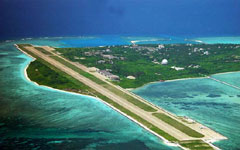TAIYUAN - "Red tourism" is gaining popularity in China as the government pumps money into developing sites related to the Chinese revolution.
North China's Shanxi province in particular is trying to accentuate the historical credentials of revolution-era bases so it can attract tourists and enjoy faster growth.
Wuxiang county in Shanxi hosted the headquarters of China's Eighth Route Army and accommodated many of the country's older generation of revolutionaries, such as Zhu De, Peng Dehuai and Deng Xiaoping.
 |
 |
Since 2008, the Wuxiang government has set up a themed cultural park, put on stage shows telling war stories and come up with travel itineraries that let tourists sample life as a guerrilla.
In 2013, two million visitors flocked there, attracted by the red tourism program, which has generated more than 2 billion yuan ($300 million), according to the county government.
"At present, there are unprecedented opportunities for red tourism in China," said Wang Shumao, a member of the country's coordinating group for this sub-sector of tourism.
"We have included this into our national development plan, and will introduce policies to support it," he said.
In 2013, the central government allocated 487 million yuan to back up red tourism. Civil affairs department also invested 2.8 billion yuan on constructing memorial sites.
And China's transport departments have dedicated 1.5 billion yuan to improving road links to revolutionary sites.
There seems to be a public appetite for commemorating revolutionaries. During the three days of this year's Tomb-Sweeping Day holiday, over 30 million people paid their respects at red tourism attractions, according to Wang.
"We should also make use of the educational function of red tourism," said Dong Jiang'ai, a professor with Shanxi University.
"It could help reduce corruption when we appreciate the efforts of these soldiers, and learn from them," he said.
It is estimated that, by 2015, red tourism sites around China will welcome 800 million tourists per year and earn a revenue of 200 billion yuan.
